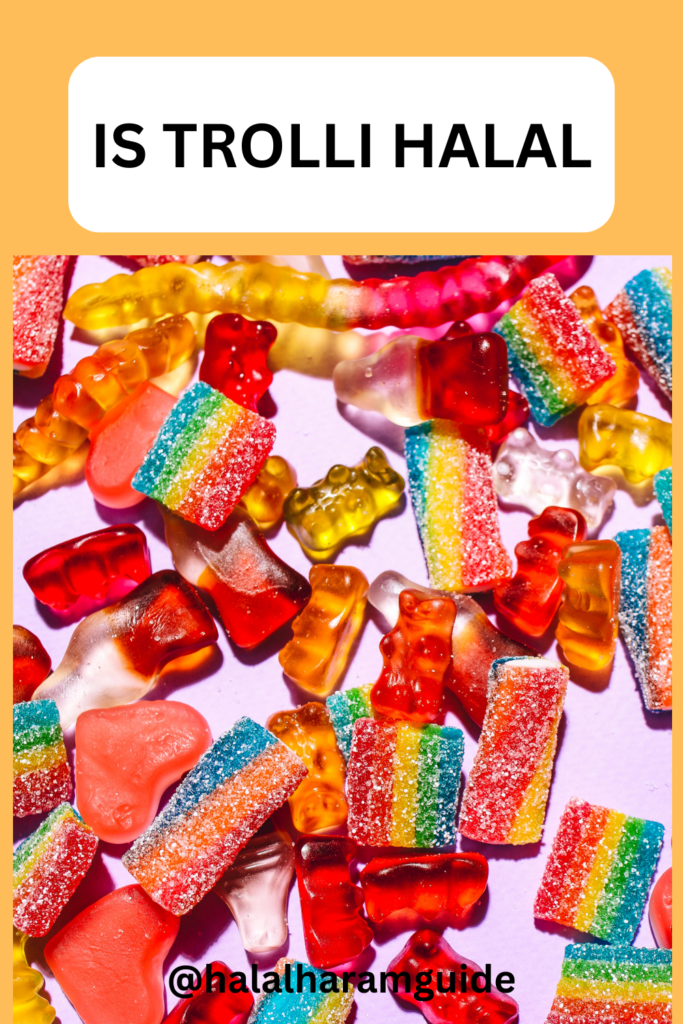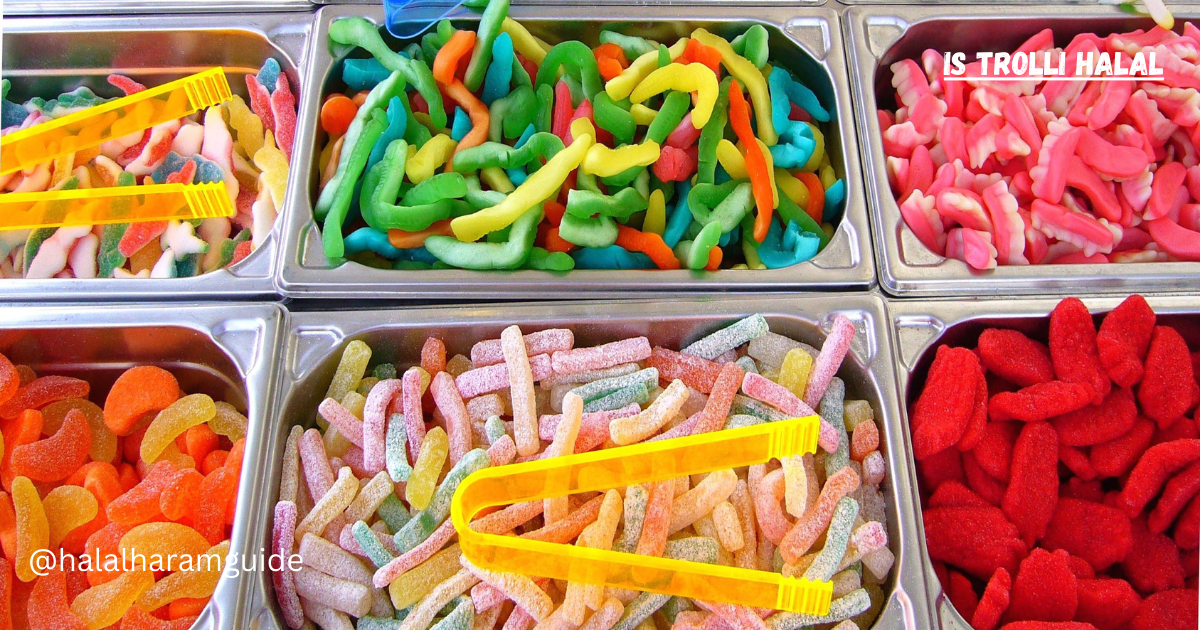Let’s talk about the topic “Is Trolli Halal?”
In the world of gummy candies, Trolli is a name that conjures images of colorful, chewy, and utterly delicious treats. However, for those who follow a halal diet in accordance with Islamic dietary laws, a crucial question arises: Is Trolli halal?
In this blog post, we embark on a delightful journey into the world of Trolli gummy candies to uncover their halal status. We’ll explore the ingredients, production processes, and key considerations that determine whether Trolli can find its place in a halal-conscious diet.
Whether you’re a gummy connoisseur or simply curious about halal candy options, read on to find out if Trolli can sweeten your halal journey.
What are Trolli Gummy Worms?
Trolli Gummy Worms are a popular brand of gummy candy shaped like colorful, wiggly worms. They are made by the German confectionery company Trolli, which is known for producing a wide range of gummy and jelly candies. Trolli Gummy Worms are typically sweet, chewy, and come in various flavors and colors, including combinations like cherry and orange, lime and lemon, and more.
These gummy worms are a popular snack and are enjoyed by people of all ages. They are often found in candy stores, supermarkets, and convenience stores. Trolli Gummy Worms are commonly used in various creative dessert and snack recipes, such as “dirt cups” made with crushed chocolate cookies and gummy worms to resemble soil and worms.
Are Trolli Gummy Worms Halal?
Whether Trolli Gummy Worms are considered halal (permissible) for Muslims to consume depends on the ingredients used in their production. To determine their halal status, it’s essential to check the product’s packaging for information regarding the source of gelatin and other ingredients. Gelatin, which is commonly used in gummy candies, can be derived from either halal or non-halal sources.
Halal-certified gummy candies, including gummy worms, are available in some markets and may use gelatin from halal sources or alternative gelling agents. It’s advisable for Muslims to look for products with reputable halal certification or contact the manufacturer to inquire about the specific ingredients and production processes used in Trolli Gummy Worms to ensure they align with Islamic dietary laws.
Ingredients of Trolli Gummy Worms
The ingredients in Trolli Gummy Worms can vary slightly depending on the specific product and flavor, but here are the typical ingredients you might find in Trolli Gummy Worms:
Corn Syrup: A sweet syrup derived from corn starch, often used as a sweetener in gummy candies.
Sugar: A common sweetening agent.
Gelatin: Gelatin is a protein obtained from animal collagen, often used to give gummy candies their chewy texture. The source of gelatin can vary, so it’s important to check for its origin (halal or non-halal) if you have dietary restrictions.
Citric Acid: This adds tartness and acidity to the candy, enhancing its flavor.
Fumaric Acid: Fumaric acid is another acidulant used to give gummy candies a sour taste.
Natural and Artificial Flavors: These are used to provide the various fruit flavors in the gummy worms.
Sodium Citrate: A salt of citric acid, it can be used as a flavor enhancer and acid regulator.
Mineral Oil: Sometimes added to prevent the gummy worms from sticking together.
Carnauba Wax: A natural wax used to give the gummy worms a shiny appearance.
Artificial Colors: Various food colorings are used to create the bright and colorful appearance of the gummy worms.
It’s important to note that the specific ingredients may vary between different Trolli Gummy Worms products and flavors. If you have dietary restrictions or concerns about specific ingredients, it’s advisable to check the packaging of the particular product you’re interested in for the most accurate information. Additionally, if you’re looking for halal or kosher options, you should look for products with appropriate certifications.
Ingredients explained with Halal or Haram status
The halal or haram status of ingredients in Trolli Gummy Worms can depend on their source and processing methods. Here’s an explanation of the common ingredients and their typical halal or haram status:
Corn Syrup: Generally considered halal, as it is derived from corn.
Sugar: Halal, as long as it is not derived from non-halal sources.
Gelatin: Often haram, as it is commonly derived from non-halal sources (such as pigs). However, some gummy candies use halal-certified or plant-based gelatin alternatives, so you should check the source of gelatin on the product’s packaging.
Citric Acid: Halal, as it is a plant-derived acid.
Fumaric Acid: Halal, as it is a synthetic acid.
Natural and Artificial Flavors: Generally halal, but the source and processing of these flavors can vary. It’s best to check with the manufacturer or look for halal-certified products.
Sodium Citrate: Halal, as it is a salt derived from citric acid.
Mineral Oil: Typically halal, as it is a petroleum-derived substance.
Carnauba Wax: Halal, as it is a plant-based wax derived from the leaves of the carnauba palm.
Artificial Colors: Halal, as long as the sources of the colors are plant-based or otherwise halal-certified.
It’s important to remember that the halal or haram status of ingredients can vary depending on their sources and processing methods. To ensure that Trolli Gummy Worms meet your dietary requirements, it’s advisable to look for products with reputable halal certification or to contact the manufacturer directly for specific information about their ingredients and production processes.
Halal alternatives to Trolli Gummy Worms
If you’re looking for halal alternatives to Trolli Gummy Worms, there are several brands and products that offer gummy candies made with halal-certified ingredients and processes. Here are a few options to consider:
Albanese Confectionery: Albanese is a well-known brand that offers a variety of halal-certified gummy candies, including gummy worms, bears, and more.
SweetZone Halal Gummy Candy: SweetZone produces a range of halal gummy candies, including gummy worms and various fruit shapes.
Candyland Halal Gummy Candy: Candyland is another brand that offers halal gummy candies, including gummy worms and other shapes.
Sunkist Fruit Gummies: Some Sunkist Fruit Gummies products are certified halal and provide a variety of fruity gummy options.
Starburst Fruit Chews: Some Starburst products are halal-certified, offering a chewy and fruity candy option.
Jelly Belly Jelly Beans: While not gummy worms, Jelly Belly offers a range of halal-certified jelly bean products that provide a similar chewy and fruity experience.
When looking for halal gummy candies, be sure to check the product packaging for halal certification or labeling. Additionally, you can inquire at your local halal food stores or online retailers that specialize in halal products to find a wider selection of options that meet your dietary preferences.
Conclusion
(FAQs)
Do Trolli gummy worms have gelatin?
Yes, Trolli Gummy Worms typically contain gelatin. Gelatin is a common ingredient in gummy candies and is used to give them their chewy texture. The source of gelatin can vary, and it may not always be halal, so it’s essential to check the product’s packaging for specific information about the source of gelatin.
What gelatin does Trolli use?
The specific source of gelatin used by Trolli may vary depending on the product and location. Gelatin can be derived from either halal or non-halal sources. To determine the source of gelatin used in a particular Trolli product, it’s advisable to contact the manufacturer directly or check the product’s packaging for information on the gelatin source.
How to know whether a gummy brand is Halal or not?
To determine whether a gummy brand or product is halal, consider the following steps:
Look for halal certification: Check if the product has been certified as halal by a reputable Islamic certification authority. Halal certification ensures that the ingredients and production processes meet Islamic dietary laws.
Examine the ingredients: Review the list of ingredients on the product packaging. Pay attention to the source of gelatin and other ingredients. Avoid products with non-halal gelatin or haram ingredients.
Contact the manufacturer: If you’re uncertain about the halal status of a specific product, contact the manufacturer directly for information on their ingredients and processes.
Is gummies haram in Islam?
Gummies themselves are not inherently haram (forbidden) in Islam. However, whether gummies are considered halal or haram depends on the ingredients used, especially the source of gelatin and any other non-halal ingredients. Halal gummies are made in accordance with Islamic dietary laws.
Can Muslims eat gummy worms?
Muslims can eat gummy worms if they are made with halal-certified ingredients and processes. This includes ensuring that the gelatin used is from halal sources or is a halal-certified alternative. It’s essential for Muslims to check product labels, look for halal certification, and inquire about ingredient sources to make informed choices regarding gummy candies like gummy worms.
- “Is Lobster Halal? Understanding Its Permissibility”
- “Is Drawing Haram in Islam? Understanding the Perspective”
- “Is Fermented Kimchi Halal? Exploring Kimchi’s Halal Status”
- “Is Collagen Halal? Unveiling the Halal Status of Collagen”
- “Is Wine Vinegar Halal? Unveiling Its Permissibility”


